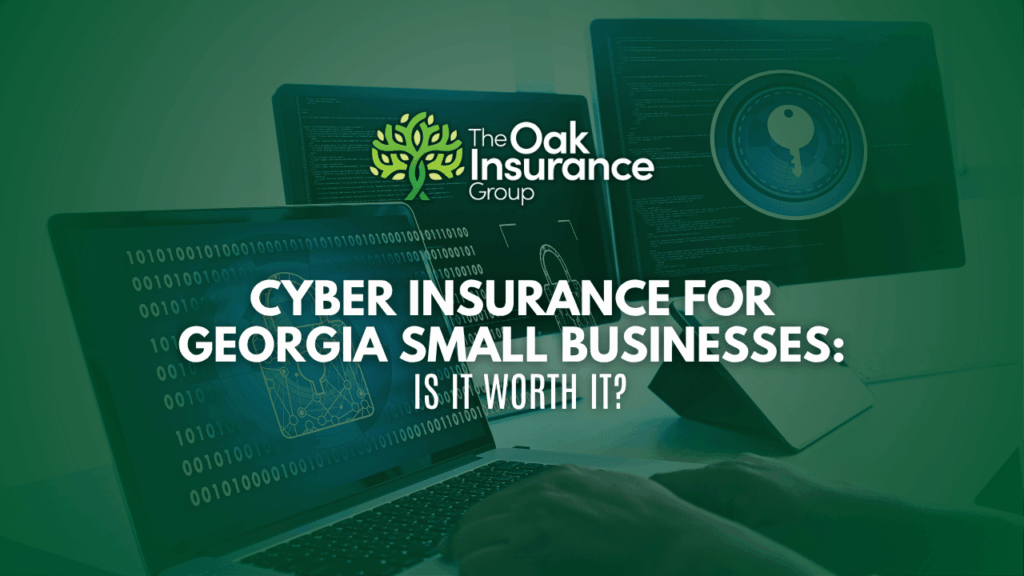
Are you confident your small business could survive a cyberattack tomorrow?
What would it cost you if your systems went down, your customer data was stolen, or your reputation was shredded overnight?
In this guide, we’ll show Georgia small business owners exactly what cyber insurance is, what it covers, how much it costs—and whether it’s truly worth the investment.
You’ll learn:
- Why Georgia small businesses are prime targets for cybercrime
- What cyber insurance policies typically cover (and don’t)
- How much it costs and what affects the price
- When and why you might be required to have it
- How to decide if it’s right for your business
Why Georgia Small Businesses Face Growing Cyber Threats
Small businesses are no longer flying under hackers’ radar. In fact, their limited IT resources and weaker defenses make them ideal targets.
Georgia’s Cybercrime Hotspots
From Atlanta’s booming tech corridor to small healthcare practices, law firms, and retailers across the state—no one’s immune. Cybercriminals increasingly deploy:
- Ransomware
- Phishing and invoice scams
- Social engineering
- Data theft and wire fraud
Even basic IT protections may not be enough.
Example: A Georgia nonprofit recently lost $50,000 to a wire scam—but recovered thanks to cyber insurance.
Financial and Regulatory Risks
A single breach can trigger massive expenses:
- Data recovery and investigation
- Customer notifications and credit monitoring
- Lawsuits and legal defense
- Regulatory penalties under laws like Georgia’s Personal Identity Protection Act or HIPAA
Worse yet, the loss of client trust could stall your business growth for years.
What Does Cyber Insurance Actually Cover?
Most small business cyber insurance policies include two main categories:
First-Party Coverage (Your Business)
- Data recovery and forensic investigations
- Lost income from system downtime
- Customer notification and credit monitoring services
- PR and crisis management support
- Ransom payments or cyber extortion costs (if covered)
Third-Party Coverage (Others Affected)
- Legal defense and settlements from customers or vendors
- Regulatory fines for mishandling sensitive data
- Breach of contract claims tied to data exposure
What’s Not Typically Covered?
- Breaches caused by outdated or missing cybersecurity (e.g., no antivirus)
- Long-term brand damage or lost future profits
- Cyberattacks from “acts of war” (depending on policy)
- Breaches through third-party cloud vendors (unless specifically included)
Pro tip: Review exclusions carefully—coverage varies widely.
Is Cyber Insurance Required in Georgia?
No, but it’s often essential anyway. While Georgia doesn’t mandate cyber insurance, industry-specific regulations often do.
You May Need It If You:
- Handle medical, legal, or financial data
- Work with larger partners or government agencies who require cyber liability coverage in contracts
- Store or process personal information (even just emails or phone numbers)
Cyber insurance can be a business enabler—unlocking new clients who demand it.
How Much Does Cyber Insurance Cost in Georgia?
Most small businesses in Georgia pay between $500–$5,000 per year, depending on:
- Industry risk level
- Business size and annual revenue
- Amount and sensitivity of stored data
- Current cybersecurity posture
General Cost Ranges
- Basic policies ($50K coverage): $85–$200/year
- Comprehensive coverage: $100–$200/month
- Average cost statewide: ~$1,450/year
Discounts may apply if you use multi-factor authentication, run regular backups, or train employees in cybersecurity.
Is Cyber Insurance Worth It?
YES—For Most Georgia Small Businesses
A single attack could bankrupt an uninsured business. Cyber insurance offers:
- Financial protection from breaches and ransomware
- Professional help when things go wrong (forensics, legal, PR)
- Peace of mind, so you can focus on recovery, not chaos
BUT—You Need to Choose Wisely
Not all policies are created equal. Before buying:
- Ensure your basic cyber defenses are in place (firewalls, antivirus, software updates)
- Read the fine print on exclusions and coverage caps
- Work with a broker who understands Georgia’s landscape and your industry
Tips to Protect Your Georgia Business—With or Without Insurance
- Assess your data risks. What do you store, where, and who can access it?
- Layer your defenses. Regular software updates, employee training, and backups matter.
- Talk to a specialist. Find a local agent who knows your industry and can walk you through policy terms and best-fit options.
Final Takeaway: Cyber Insurance Isn’t a Luxury—It’s a Lifeline
At the end of the day, we’ve all seen how quickly a cyberattack can derail a small business—especially one that lacks the resources for a quick recovery. Now that you understand what cyber insurance covers and what it could cost your Georgia business, it’s time to take the next step.
Whether you’re comparing policy options or just unsure what coverage you have today, connect with a local cyber insurance expert. The future of your business might depend on it.

